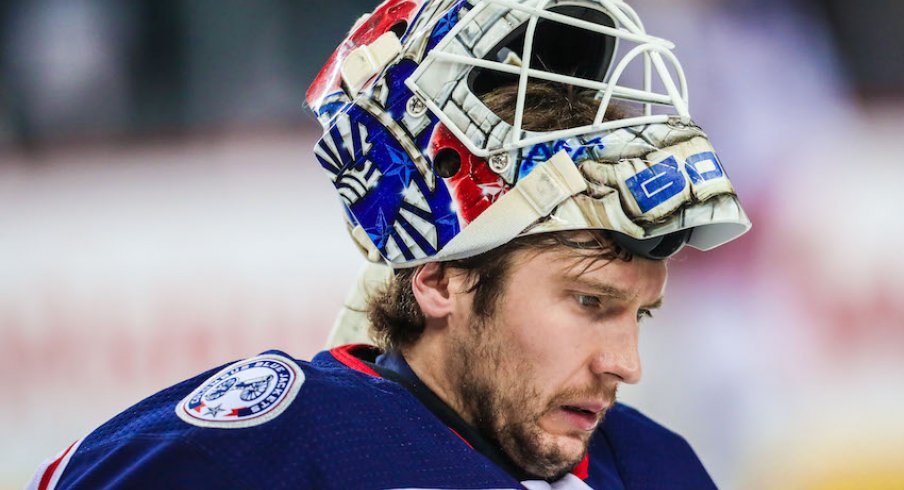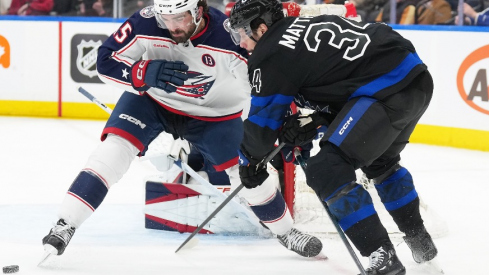Fasten your seat belts, friends.
For the third time in six years, Jarmo Kekalainen and Paul Theofanous are going to lock horns in a contract negotiation.
That sentence alone should send a chill up your spine.
These things are never easy, especially when it comes to Theofanous, who represents a guy named Sergei Bobrovsky. These are delicate times for the Blue Jackets, who have a few hot-button items to address in the near future, including contract extensions for three of their most important players: Bobrovsky, Artemi Panarin and Zach Werenski.
Just a casual summer for Kekalainen and co., right? Yikes.
But the anxiety starts with Bobrovsky's situation. He's a two-time Vezina Trophy winner before his 30th birthday, he's undoubtedly one of the top-five goalies in the world, and he has a spotty track record in the Stanley Cup playoffs – which is tough, because without Bobrovsky, the Blue Jackets wouldn't have been in the postseason in 2014, 2017 or 2018.
Let's revisit Rounds 1 and 2 between Kekalainen and Theofanous:
2013
Scott Howson traded a few draft picks for Bobrovsky at the 2012 NHL Draft, a move that many thought was meant to challenge incumbent Steve Mason. Instead, Bobrovsky quickly assumed the No. 1 job and nearly got the Blue Jackets into the playoffs on his own. Kekalainen replaced Howson mid-season and was left to deal with a contract negotiation for a Vezina Trophy winner, and it got messy.
There's a belief that, at one point, the Blue Jackets were close to trading Bobrovsky at the 2013 draft because they couldn't come to an agreement with Theofanous.
Eventually, amidst rumors of KHL offers and offer sheets from rival NHL clubs, the Blue Jackets and Theofanous agreed on a two-year, $11.25 million deal. Here's what Kekalainen told me at the time, regarding the "distractions" around that negotiation:
"I would just call it a unique situation with everything that was going on around him. Obviously there’s the KHL, and the team he played on (was a factor). It’s real, but it’s what you have to deal with. There was interest from so many different places and not just the NHL, and we didn’t want to lose him. He had arbitration rights – that’s another thing we had to weigh in."
Bobrovsky got the Blue Jackets into the playoffs in 2013-14, setting the stage for another round of talks the following season.
2014-2015
Theofanous rarely speaks publicly, but there was ample tension on both sides during the 2013 negotiations. In 2014-15, the Blue Jackets and Theofanous opened talks on a contract extension, one that would take effect after Bobrovsky's prior deal expired following that season.
This time, the negotiations weren't nearly as public (largely because Bobrovsky was under contract and there was less pressure to get something done immediately) but it wasn't a cake walk. Initially, it was believed that Bobrovsky wanted to wait until after the season to talk about a new deal; Pierre Lebrun, then with ESPN, said the talks were "toxic" earlier in the season.
But on Jan. 9, 2015, they came to an agreement.
The new deal was four years and $29.7 million ($7.425 million AAV) and would take Bobrovsky into unrestricted free agency years. Here's Kekalainen on somewhat-smoother talks the second time around, via NHL.com:
"I don't know if it's different, but sometimes the situations are a little bit different," Kekalainen said. "People are in different stages of their lives and it just happened that year. It was a shortened year of the NHL and he just kept getting better and better and better and better, and his numbers kept getting better, and then he won the Vezina, and so it took a little longer time than usual, but that's part of the process."
We're on the brink of another "process."
What's Next?
In 2013, he was paid like a solid up-and-coming goaltender who had No. 1 potential. In 2015 he was paid like a legitimate No. 1 goaltender, and in 2018, Bobrovsky will want to be (and rightfully so) paid like one of the best goalies on the planet.
The contract to look at here is Carey Price's, and no doubt, Theofanous is doing the same. Price signed an eight-year, $84 million deal ($10.5 million AAV) with the Canadiens last summer, coming off a deal that paid him $6.5 million annually. Bobrovsky's numbers are comparable to Price's, though Price has had a longer run of sustained success and is a year older than Bobrovsky.
These are interesting times for the Blue Jackets. They love Bobrovsky and view him as one of the most vital cogs in their success, but they should be understandably leery about his so-so playoff performances and the prospect of paying him "Price money." What's more realistic (though Theofanous and Bobrovsky likely disagree) is that Bobrovsky's value falls somewhere between Henrik Lundqvist ($8.5 million per season) and Price.
If that's the case – with Bobrovsky's contract somewhere in the neighborhood of $9 million per year – then the Blue Jackets and Bobrovsky might have a future together. Once we get into double digits, however, it's hard to see the team making that kind of commitment, especially with youngsters Joonas Korpisalo and Elvis Merzlikins waiting in the wings.
Follow 1st Ohio BatteryFacebook, Twitter, Instagram and YouTube


